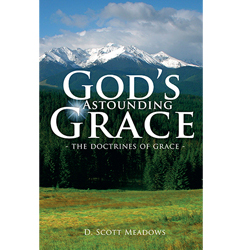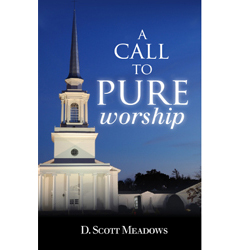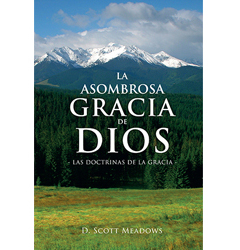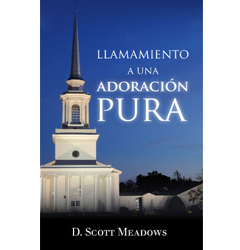

Providence and Amazing Conversions
An abridgement and paraphrase1
D. Scott Meadows
The most glorious display of Providence in this world is in the conversions of God’s people. Here the wonder far exceeds its ordering the circumstances of our births, the molding of our bodies, and the general courses of our lives, because apart from our conversions, these other blessings would have meant little. Conversion is the greatest blessing by far you have ever known! Your hearts should be deeply affected by remembering this. Saints love to meditate on how the Lord saved their souls.
This topic may tempt some true Christians to discouragement because they cannot remember the specific time and way they were converted. Therefore I would make an important distinction.
Some people are converted in riper years after living in sin for quite a while. In their cases it is easier to discern the Holy Spirit’s saving work in them—His illuminating them, convicting them, humbling them, and drawing them to Christ. They were at least somewhat mature and self-aware. Other people are converted while still quite young. In their case God used a godly education as a means of grace to their hearts. They can remember having truly pious affections while still little children, such as fondness for godly persons, a tender conscience about duty, pain on account of indwelling sin, and so forth, but it is harder for them to give an account of their experience, since it was less evident and discernible at the time. However, if they have evidences of saving grace now, there is no need to be troubled by this, but rather thankful that God spared them from many sins.
But where people can remember the details of their conversion experience, it must be an enjoyable meditation indeed! Several things about it in particular are sweetly alluring:
1. Providence, in a wonderfully strange and unaccountable way, arranges everything involved in conversion down to the minutest detail.
This is illustrated in the case of the Ethiopian eunuch (Acts 8.26-30), who just happened to be reading Isaiah, and just happened to have a judicious interpreter at hand in Philip, and just happened to have the state of mind where he was ready to receive the first light of the knowledge of Christ.
Another remarkable example is Naaman the Syrian (2 Kgs 5.1-4) who had leprosy, whose army had captured a little Jewish girl to be his servant, one who knew of Elisha the prophet with miraculous power to heal incurable diseases, etc.
The same wonderful Providence is on display in the conversion of the Samaritans (John 4.4). Christ needed to travel the route from Judea to Galilee which put Him in their neighborhood. He happened to rest at Jacob’s well at high noon when it was hot and He was thirsty. A Samaritan woman was there with a guilty conscience and curiosity about religious controversy, and when Christ had saved her, she went and testified to others, so that many in that city were converted with her (vv. 29, 41). Think about how God—the Creator, Sustainer, and Governor of all His creatures—orchestrated innumerable people, thoughts, and circumstances to cause such a wonderful event!
Junius, while still young, was a convinced atheist, felt he had to admit that his marvelous, narrow escape from death in Lyons, France, was an act of God. Then his father called him home and persuaded him to read the Gospel of John, and this worked upon his heart so powerfully that he was completely won to Jesus Christ.
Many Spanish soldiers went on a military mission to Germany, and some of them, staying in towns inhabited by godly ministers and devout Christians, were converted to Christ.
The famous preacher Mr. Robert Bolton began as an excellent scholar, though quite irreverent, even to the point of jeering godly men. Later, he was brought to repentance by providential companionship with a godly gentleman named Mr. Peacock.
A minister in Wales was converted by means of a scrap of paper. He bought something from a peddler at a fair, and tore off a leaf of Mr. Perkin’s catechism to use for wrapping. Reading a line or two of it was enough for God to convert him.
Sometimes marriage brings a godly person into a carnal family and people are converted as a result. The godly Mr. John Bruen, in his second marriage, agreed to live for a year in his mother-in-law’s house, and through him the Lord began working on her soul, and then upon several other relations and servants in that household, until quite a number were saved.
The reading of a good book has brought many to Christ. Many German theologians have been converted through Luther’s writings. Even more a certain scholar named Vergerius who was suspected of drifting from the Roman Catholic Church thought he would confirm his loyalty to its cardinals by writing a refutation of German “apostate” Protestants, but while he was reading them, he found himself convinced of the true Gospel and in possession by grace of saving faith in Christ! His Papist brother was so concerned about him that he set about to recover him for Rome, but in the process, he also considered the Protestant case and he was won over to the Lord. Then they both began preaching justification by the free grace of God through the blood of Christ.
God has even used the forgetfulness of a minister to convert sinners. Augustine once lost his train of thought while preaching a sermon and found himself, unplanned, exposing the errors of the Manichees. One of his hearers (Firmus) who had been a Manichee for many years was overcome with tears. Another preacher picked up the wrong Bible on his way to the pulpit—one which lacked not only his sermon notes but also, the pages were torn out of the very chapter upon which he had planned to preach—and so he decided on the spot to preach on 2 Peter 3.9, “The Lord is not slack concerning his promise,” and found the Lord helped him very much in his remarks. A solid convert was won that day, one who testifies that this was the first and only means of his salvation.
Sometimes just accompanying others on a neighborly visit for mundane reasons has become an instrument of conversion. This was the case with many Jews who accompanied Mary to Bethany out of respect to her deceased brother Lazarus, but it was there that they met Christ, saw what He did, and believed on Him (John 11.45). Once two men went to visit a dying neighbor, and the Christian visitor expressed concern to the 76-year-old non-Christian visitor that many people trust in their own good works rather than Christ for salvation, and the old man realized he was just such a person. From that day onward, his testimony was that if he had not lived to be 76, he would have gone to hell, because until the day of that visit he had not known Christ.
Godly men unjustly committed to prison is another way God uses. Providence appointed Paul a prisoner so his jail keeper would become spiritually free (Acts 16). Under the tyranny of bloody Queen Mary, Dr. Barns saw his keeper converted and was able to celebrate the Lord’s Supper in prison with him.
Scattering ministers and Christians by persecution has been the means of bringing home many lost sheep to Jesus Christ. So it was in Acts 8, and there are many similar examples in our own day.
A slave fleeing his master is another tool of Providence to show saving mercy. Remember Onesimus who ran away from Philemon and found Paul in prison. He led this slave to the Lord of all.
Ironically, some men have gone to ridicule the preacher and become truly pious instead. Mr. Firmin tells the story of a notorious drunkard like this, but when Mr. Wilson began to pray, this cold sinner’s frozen heart began to thaw. When the text was announced, “Sin no more, lest a worse thing come unto thee” (John 5.14), he could not contain his feelings. In the midst of that sermon, the Lord radically changed his heart. This is all the more noteworthy because before his conversion he was so fierce a Gospel opponent that the minister was afraid to pass in front of his shop door on his way to church!
God uses many other kinds of incidents to rescue His elect from their sins, like a passing serious and godly remark, the death of a spouse or child, a fit of sickness, and a thousand other similar occasions. Ministers moving from one place to another can see conversions as a result, even when they end up in places they never intended to go. Thus it was with Paul and Timothy who were directed against their original inclination away from Bythinia and into Macedonia (Acts 16.6-9).
I personally know a godly minister, now deceased, who was preparing a sermon on a rousing subject for his own congregation, and he was strongly moved by the Spirit to go preach it first to a nearby assembly with no minister, a congregation known for chasing off several pastors who had tried to serve them. This minister found it very difficult to submit to the Lord’s direction, but when he finally preached to them, he discovered that the Lord opened a door beyond all expectation, and several ungodly people received Christ. Afterward, surprisingly, he was invited to give a weekly lecture there, and many more were saved as a result.
This same man, on another occasion, was riding his horse and happened to pass by some in a scuffle, and when one had forcefully thrown his opponent to the ground and was standing there exulting in victory, the preacher addressed him along these lines: “Friend, you are obviously a strong man, but the Scripture says that strong men should not glory in their strength. Don’t you know you have to wrestle, not with flesh and blood, but with demonic powers and spiritual wickedness, and that it will be so grievous if Satan finally trips you into hell?” After about 15 minutes of serious conversation about these things, the pastor went his way, but such a lasting and serious impression had been made upon the young wrestler that he felt he must seek the counsel of a godly minister. Later, this minister was able to give a joyful account of the young man’s conversion, when his deep change of heart was undeniable.
God is even able to use the malice of Satan and the wickedness of men as instruments for conversion. Let me tell you an unforgettable story from my firsthand knowledge. In 1673 a ship sailing from Virginia was coming into the port of Poole. Aboard was a young man but 23, deeply depressed, afflicted by the devil who aimed to ruin him. The Lord preserved this fellow from attempting suicide until the ship had docked. Then one morning, this distraught young man, just out of bed, took a knife and sliced open his own throat, making a wound both deep and large. To hasten death, he also thrust the knife into his stomach and lay wallowing in blood until his brother saw him and called for help. A physician and surgeon came in and assessed that no one could survive this. All they could do presently was stitch up his throat and apply a plaster to his hemorrhaging stomach so that the dying man could utter his last words. The air from his lungs was coming out of the throat gash before it reached his mouth, so he could not verbalize anything.
I found him the next morning, amazingly, still alive, but I suspected he was within minutes of eternity, so I tried hard to bring him to his senses spiritually. I asked him how he judged himself in God’s sight, and he said he was hoping in God for eternal life. I told him I was afraid that was a vain hope in his case, because Scripture says, “No murderer has eternal life in him,” and he had attempted self-murder, the worst kind. When he heard this he began to understand he was a lost man, and his soul was deeply troubled at the thought. Then he began to bewail his sins, and asked me if there could be hope for someone like him. I said that while his sin was very great, it was not unpardonable, and that if the Lord gave him repentance and faith in Christ, he would surely be forgiven. Being unfamiliar with these Gospel truths, he let me teach him and greedily sucked them in. That was when he began praying with great fervor for God to change his heart. He begged me to pray for him, too, and I witnessed the Lord melting his heart like never before.
So I summarized the most important things for him to remember and told him I had to leave. I never expected to see him again in this world, nor did others think he could survive long. But all that day he desired so earnestly fellowship with Jesus Christ. All he wanted to hear about was Christ! That evening I saw him again, and he testified that the Lord had given him repentance for this sin of self-murder and every other sin, and that he saw like never before the evil of sin, and that he appropriately loathed himself, and was heartily willing to take Christ on His own terms. But he wanted to know if Christ would really apply His blood to one who had shed his own blood. I assured him that Christ had even forgiven those who shed His blood, and that was a greater sin than his. “Well, then, I will cast myself upon Christ. Let Him do by me whatever He wants.” That is how I left him that night.
The next morning his large stomach wound was to be opened, and since the surgeons were fairly sure he would die on the spot, I was called to his side for prayer with him. When they opened the abdominal wound, his stomach organ was swollen, all black and blue, gashed open and laying upon the outside of his body, so they all concluded it was impossible for him to live much longer. However they stitched it closed, bathed it in a warm solution, pushed it back inside him, and closed up the flesh, leaving him to the disposal of Providence. In the process of time he was healed, not only his throat and stomach, but of the more dangerous wound sin had made in his soul. I counseled him for many hours during his recuperation, and after he had returned home, I received a letter from Mr. Samuel Hardy, a minister in his town, to the effect that this young man was plainly the subject of a great and thorough work of God’s saving grace.
Oh, how unsearchable are the ways of Providence in leading people to Christ! Hearing this story might tempt someone to sin like this so that grace may also abound in their case, but that would be most presumptuous on their part, and they are likely to perish if they try. We only report this amazing Providence to magnify the honor and glory of God in a special case, and to show how He is able to recover sinners in ways we do not understand.
2. Providence is also wonderfully strange and unaccountable in the way it carries on soulwork to perfection. It does this two ways:
It quickens and revives fresh convictions and troubles for sin. We begin to lose the beneficial spiritual sensitivities we experienced when we were new converts, but Providence prevents a total loss, and rekindles them. God may use a pastor to speak on a Scripture passage in such a way that it feels he knows our particular case exactly. Sometimes God directs a Christian in private to a particular biblical passage perfectly suited to him. Sometimes a believer falls into a new sin that alarms his conscience and he feels as miserable about this as ever. Experienced Christians can easily testify such things have happened to them. Surely you can look back and discern the rod of God’s discipline in your life that shook you out of your complacency. This follows such a pattern that some Christians can anticipate from their own state of heart that God is about to afflict them in love.
It supports souls when they are sinking into despair. Mr. Bolton relates a case when Providence simultaneously granted both revived convictions and seasonable supports in the depths of trouble when a particular Christian had weakened and begun to associate with his old, wicked companions. God brought to his mind the warning of Proverbs 1.24-26 along with the comfort of Luke 17.4, and repenting of his sin, he knew a deep peace once again.
Hear also the case of Mrs. Honeywood, so depressed that she was very near to concluding she was no object of God’s grace and mercy. When a worthy minister visited her for counseling, she picked up a fragile glass vase from the table and said, “Sir, I am as sure to be damned as this glass is to be broken,” and then she hurled it toward the floor. Both were astonished when it remained completely undamaged! The pastor picked it up with wonder and rebuked her presumption. “See how Providence has preserved it, and shall He not much more preserve you?” etc. (he said something to this effect, not the exact words). After that she began to recover her spiritual peace.
3. Now let me apply these things to you and your own case. Do you realize your obligation to Providence for bringing about your conversion? Consider the various kinds of mercy it has given to make you a Christian and to keep you in a state of salvation.
A singular mercy. God shows mercy to you in many ways but his converting you is in a class by itself. Remember how God put you in particular circumstances and used certain means to bring about your conversion. Your heart should melt every time you think about this.
A surprising mercy. You had no idea how great the good God had planned for you and was providing in the times leading up to your conversion, any more than Saul who went to seek his father’s donkeys and came home as Israel’s anointed king (1 Sam 9.3, 20), or Peter when Christ exposed his ignorance (John 13.7), or Zacchaeus when he had climbed a tree merely to see Christ and ended up receiving Him both as Guest and Savior (Luke 19.5-8). Little did you think what Providence intended when you heard a converting sermon, for example!
A distinguishing and seasonable mercy. You were saved in a good hour, in the nick of time. You may have heard hundreds of sermons before the day you were saved, but none stuck because the hour had not yet come. But one day, the Lord designed to save you, and then Providence presented you to Him. And this when mercy bypassed others hearing the same sermon! “Many lepers were in Israel in the time of Eliseus [Elisha] the prophet; and none of them was cleansed, saving Naaman the Syrian” (Luke 4.27). So mercy also distinguished you from others. O blessed Providence!
A weighty and important mercy. Mercy comes with handfuls of blessings—health and riches, honors and pleasures, and Christ and salvation. The world is full of mercy’s left-hand favors, but comparatively few receive its right-hand favors, including conversion. This is the one that comes by means of the most and greatest difficulties (Eph 1.19-20).
A spiritual mercy. Converting mercy is as far above all others as gold exceeds dirt (Rev 3.18).
A sovereign mercy. This flows from the fountain of God’s electing mercy, only to those chosen from eternity by the King of kings (1 Thess 1.4-5).
A saving mercy. As we can look back and infer one’s election from his conversion, so we can look forward and anticipate his final salvation from his conversion (Heb 6.9).
An eternal mercy. This will stick with you when all other blessings fail, such as parents, spouse, children, estate, honors, health, and physical life (John 4.14).
Therefore, mark well that Providence which set you in the way to receive this mercy of conversion. It has done for you what no ministers and angels could ever do. This mercy is so great that it makes every detail related to your conversion both important and precious. Ω
1. Based upon a modern reprint edition of John Flavel’s Mystery of Providence, chapter 3, “The Work of Conversion.” Abridgment and paraphrase by D. Scott Meadows, Pastor, Calvary Baptist Church (Reformed) of Exeter, New Hampshire. Composed December 2012.
All Rights Reserved. Used with permission. No part of this article may be used or reproduced in any manner whatsoever or translated without written permission.
The following books by D. Scott Meadows are available at Trinity Book Service and Cristianismo Histórico:
Ebook: God’s Astounding Grace | D. Scott Meadows
Ebook: A Call to Pure Worship | D. Scott Meadows




